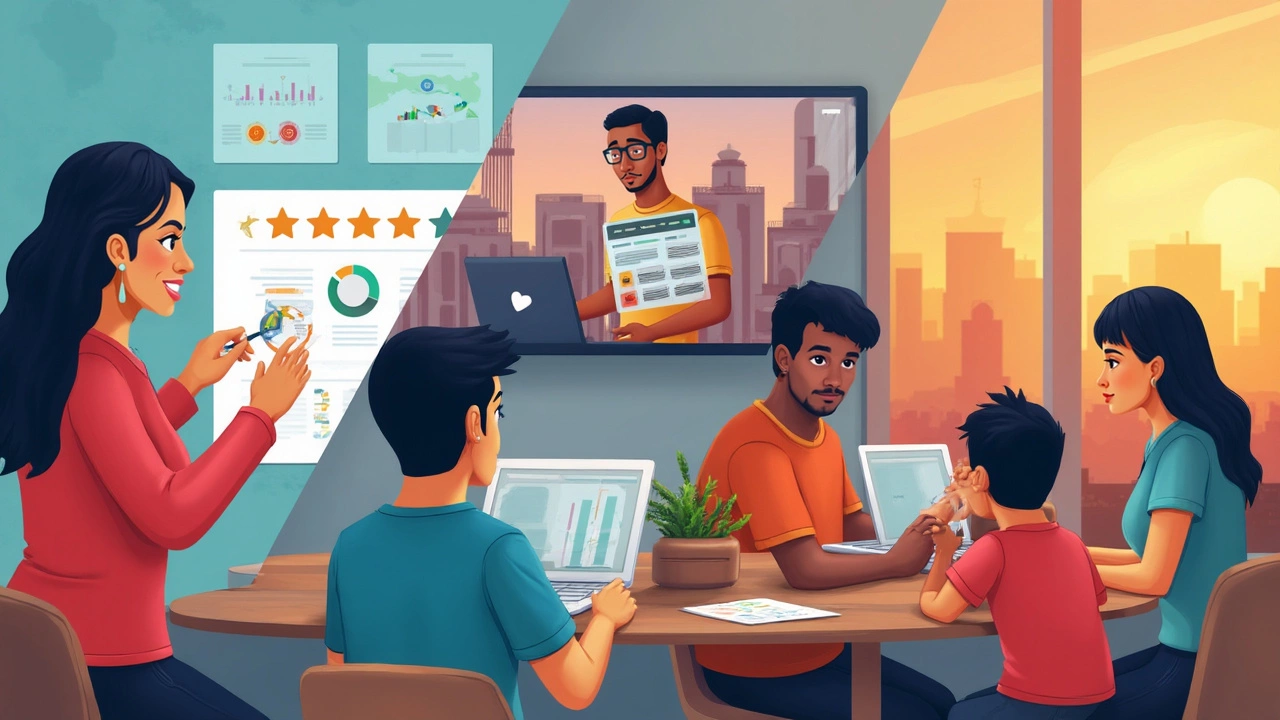So you want to level up your skills but you’re staring at a lineup of e-learning platforms, each promising to turn you into a career ninja, entrepreneur, or coding wizard. Feeling lost? You’re definitely not alone. This is one of those choices that feels simple at first—until you realize there’s a different platform for almost every taste, budget, and learning style. The idea that you can learn pretty much anything online is wild. But finding that sweet spot between quality content, good teachers, and the right price? That’s where things get interesting.
Here's something to chew on: A report by HolonIQ in 2024 found that over 360 million people took at least one course online last year. That’s like the combined populations of the US and Brazil logging in to learn together. And the market’s not shrinking—snagging a course online is basically the new normal, whether you’re picking up Python or learning how to bake sourdough. But with numbers like these, the big question is—among all these choices, best e learning platform isn’t one-size-fits-all. Let’s break down what’s really out there, what actually makes these platforms tick, and how you can make the smartest choice in 2025.
What Really Sets E-Learning Platforms Apart?
It's tempting to lump all e-learning websites together, but the experience you get on Udemy versus, say, MasterClass or Coursera? Night and day. First, consider the teaching format. Some sites are really structured—like Coursera, where actual university professors walk you through full curriculums and even throw in deadlines (as if you needed more of those!). Others, like Udemy, serve up a buffet of bite-sized courses about pretty much anything you can think of; there are over 210,000 courses on the platform as of June 2025. It’s a little like wandering through a massive digital library, only there’s video instead of musty textbooks.
The level of interactivity matters too. Have you ever tried a platform like edX? You're handed real college-style assignments with some courses, peer-graded work, and in certain cases, team projects with people around the world. For those who love learning by doing, Skillshare steals the show. Its project-based courses get you uploading your own work, getting feedback, and sometimes even collaborating with others. Want superstar instructors? MasterClass is your VIP backstage pass. Imagine learning filmmaking from Ron Howard or getting business advice from Howard Schultz. It’s more Netflix-for-education than traditional school, but if you buzz off big names, it’s hard to beat.
And we can’t skip the tech side. Some platforms nail the learning experience with slick mobile apps, downloadable videos, forums, quizzes, and all kinds of tools to keep you plugged in. Udemy lets you take stuff offline, so your daily commute suddenly doubles as your power hour. Coursera and LinkedIn Learning have nifty progress trackers to keep you motivated. Nothing feels better than seeing that completion bar inch to the finish line.
What about credibility? Here’s the raw truth: not every course certificate will make your resume sing. But a Coursera Professional Certificate in Google IT Support, for example, is something real employers recognize. LinkedIn Learning lets you tack completed courses right onto your LinkedIn profile for that extra flex.
Speaking of, here’s a quick side-by-side look at what some of the biggest names focus on:
| Platform | Main Focus | Number of Courses | Certification? | Monthly Cost (avg) |
|---|---|---|---|---|
| Udemy | Wide range, self-paced learning | 210,000+ | Completion certificate | Per-course ($15-$200, often on sale) |
| Coursera | University-style, degrees, pro certs | 7,000+ | Accredited, pro certificates | $39+ (subscription or one-off) |
| LinkedIn Learning | Professional, business, tech | 21,000+ | Course certificate | $39/mo |
| edX | University, credits, microdegrees | 3,500+ | Accredited, pro certificates | Varies, free audit or $50–$300/course |
| MasterClass | Celebrity instructors, creative arts, lifestyle | 180+ | No formal cert | $15/mo (annual bill) |
| Skillshare | Creative, project-based | 35,000+ | No formal cert | $32/mo or $168/year |
Price can be a dealbreaker, but the secret sauce is sometimes in the extras. Udemy’s lifetime access lets you come back years later for a refresher. Coursera partners with real universities. LinkedIn Learning ties right into job hunting. Choosing isn’t just about the course topics; it’s about the ecosystem you want to grow in.

Evaluating E-Learning Platforms: Tips and Surprising Insights
If you’re stuck between two or three e-learning giants, here’s a tip: pick your platform based on what you actually want out of the experience, not just the brag-worthy name or price tag. The best path is the one that matches your learning goals, style, and schedule. Start by asking: Do I need real credentials? Or am I just learning to tinker with a new hobby? There’s a massive difference between a Google-backed certificate from Coursera that’ll boost your career, and a Skillshare calligraphy class for fun.
Here’s a wild stat for you—according to Class Central’s 2025 survey, about 60% of online learners never finish the courses they start. Why? The biggest culprits are lack of engagement and overwhelming content. You’re way more likely to stick with a course that’s broken up into short, focused lessons. This is why platforms like Udemy and Skillshare are catching on with younger learners—snack-sized learning fits short attention spans. If you love ticking things off a list, LinkedIn Learning’s micro-learning approach may keep you locked in.
Let’s not ignore the community piece. The best instructors won’t just dump info and disappear. On platforms like Skillshare, community projects and discussion groups can keep you inspired when your motivation tanks. Udemy’s Q&A sections get crowded fast, but you’ll often find students asking sharp questions and instructors responding with real solutions. Coursera and edX take things up a notch, with active forums and peer review in many courses that mimic a mini college community. If you’re the type of learner who thrives on peer feedback, skip platforms that feel too much like a solo mission.
If you want to learn on the go, mobile experience can make or break it. Udemy and LinkedIn Learning both score high with mobile apps that let you download lectures for offline study. This is gold if you commute or get your best studying done with distractions locked out.
The last tip: check if employers in your field recognize platform certificates. Coursera’s Professional Certificates often pull in big names like Google or IBM—not all platforms can say that. LinkedIn Learning, thanks to its, well, connection with LinkedIn, sometimes helps you get spotted by recruiters after certification. For pure creative clout, MasterClass might get your juices flowing, but those certificates are just for show (nice if you frame them for Instagram, though).
Here's a fast checklist to zero in on your best option:
- Decide if you want accredited certification or just self-improvement
- Test drive the free trials or audit courses where you can
- Check student reviews—red flags like outdated content or MIA instructors are hard to miss
- Consider how much interactivity you crave—do you want feedback, or prefer solo study?
- Don’t underestimate user experience—if the platform feels clunky, you might quit before you start
Interesting fact: many platforms now use AI to recommend the next course for you, based on your learning history. If you’re always falling into the "what next?" trap, that’s a useful nudge to keep the learning streak going.

The Big Players: Who Wins Where—and Why?
If you’re still wondering which e-learning platform is best, here’s the deal: the "winner" changes depending on your needs. For sheer variety, Udemy crushes it—think Photoshop, programming, personal finance, even tarot reading. The open nature of Udemy means anyone can be an instructor. This is awesome when you want oddball skills, but double-check those course reviews to dodge duds. Udemy’s sales are legendary—don’t buy at full price, ever. Courses often drop from $150 to $12.99 with a little patience or a coupon.
Looking for deep, legit, professional growth? Coursera’s got your back, especially with official certificates and even full-on degrees from brand-name schools like Stanford or Imperial College London. The numbers are wild—more than 125 million learners since they started, and partnerships with 325+ universities and companies. That credibility comes with stricter structure and, yes, deadlines. If you’re prepping for a proper career move, few platforms beat Coursera.
Need career skills, especially stuff like business, project management, or design? LinkedIn Learning has the inside edge. You get access to a suite of business, software, and creative courses tied directly to your work profile. Fact: LinkedIn says professionals who complete LinkedIn Learning courses are reported to get contacted by recruiters 2.5x more often within six months. That’s not nothing if you’re hunting for gigs.
For those craving university-style rigor (but not the price tag), edX is tough to beat. Over 40 million users, real university credits, microdegrees, and an emphasis on deep-dive academic content without forcing you back into college halls. If you want to taste Ivy League without the loans, edX gives you a shot.
If you’re inspired by A-list fame, MasterClass is a novelty you won’t get anywhere else. The production value is through the roof. You might not get a job off their certificates, but you will score some killer creative inspiration.
Skillshare fills the creative gap, focusing on getting you to make and share real projects. 35,000+ courses, strong teacher ratings, and a heavy project focus makes it brilliant for budding creators or anyone itching to build a portfolio.
Hot tip: Don’t ignore niche platforms. Codecademy rules for coding beginners, Pluralsight digs deep for tech pros, Domestika is a haven for designers and illustrators, and FutureLearn shines in the UK and Europe. If you want super-specific training, there’s probably a platform for it—just takes some digital digging.
One last surprising twist for 2025—many platforms are shifting to AI-driven adaptive learning. This means more personalized study paths, smarter quiz recommendations, even feedback on written projects in seconds. If you want the future of learning today, keep an eye out for these tools rolling out fast.
So, which e-learning platform tops the charts? The only honest answer is: it depends who you are and what you want from your next learning adventure. If you’re looking to try before you buy or want to keep your costs low, Udemy or Skillshare. Gunning for a promotion or career pivot? Coursera, LinkedIn Learning, or edX. If your dream teacher is a celebrity, hit up MasterClass. Want coding chops? Codecademy’s focused track saves you time. At the end of the day, the best e-learning platform is the one that gets you pumped to learn—and actually keeps you hooked until you finish. So, pick your learning playground and go for it.
